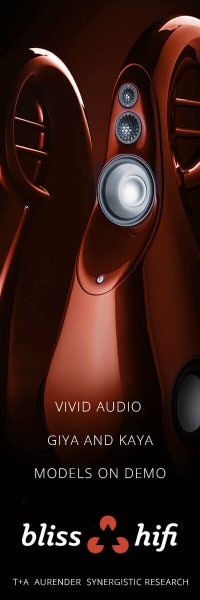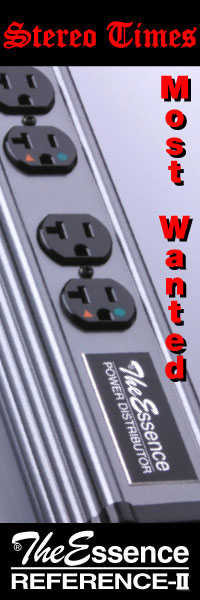The Internet: Stewpot or Forum?
| The Internet: Stewpot or Forum? |
| Commentary |
| Mike Silverton |
| October 1999 |
A controversy simmers over the relative merits of audio webzines and paper publications, and more particularly, over the comparative skills (hearing acuity, musical tastes, ethics, sanity, sexual preference, birth sign, zip code, etc., etc.) of those who contribute to either format. As a participant in both, I think it prudent to remain in the wings where I can perhaps be of some service by elevating the issue one click up from the fray.
If we have in mind reviewers and correspondents who comment (and bellow) based on the strength of what they hear, I suggest that we oughtn’t direct our attention exclusively to those whose opinions carry the greater weight. The overriding issue, rather, is objectivity and its obverse, subjectivity, as audio’s principal modi operandi. Not merely in commentary, but in all its aspects. I once asked Dave Wilson why he chose a binding post I find cumbersome. Because it sounds better. Wilson went on to explain the process by which he and his staff arrived at that conclusion, and as careful and precise as it appeared to me, it also occurred that the decision to go with the post in question lay in the subjective realm, a scientific-seeming procedure (read: objective) notwithstanding.
It sounded to their ears the least intrusive device. I mentioned this to Howard Ferstler, who is to Audiophilia what Harry Houdini was to the once fashionable séance. (A rift developed in the friendship between Houdini and Arthur Conan Doyle, the author of the Sherlock Holmes stories, when Houdini’s debunked Doyle’s attempts to connect with his dead son.) As is his custom, Ferstler scoffed. I was being had. In similar wise was I duped at Madrigal Audio, where I was told that a more costly circuit board material, indeed the solder on that board, affects an amp’s sound. For Ferstler this is rubbish. I’m a gullible naïf and dangerous moreover, insofar as I pass along these outrageous claims to eager beavers brandishing cash.
If you’ve not heard Ferstler’s name, you’ve not been out of touch. In audio journalism, strict objectivists are a vanishing breed, or if not quite, at least in a defensive crouch. Julian Hirsch of Stereo Review, Audiophilia’s then bête noir, would list his measurements of a given component along with the comment that, yes, it’s a dandy little gizmo, but really, with numbers like these, they’re all going to sound pretty much alike, so go for the features you find most attractive. I exaggerate only a little. In any event, those were the days, and good riddance to them.
A, we know better. Hardware that measures the same or close in the usual array of terms is not guaranteed to sound the same. I wonder whether anyone’s test instruments can account for the superiority of my Mark Levinson No. 33H mono-pair amps over their (since discontinued) predecessor, the Mark Levinson No. 333. Am I translating dollar signs and stately good looks into better sound? Ferstler would say, exactly so, quite likely without having troubled to listen. I say, well, maybe, but remain skeptical that such a possibility can sustain its illusion for as long as this one’s held. In purely Ferstlerian terms, we enter upon yet more controversial ground in detecting clear differences among interconnects or, heaven help me, my mysterious Quantum Life line conditioners. No need to ramble on. The point is made.
A, we know better, right enough. Among those to whom I address these comments, we’ve scant grounds for dispute so far. The stewpot nestles in point B. The true-blue issue is whom to trust, the graybeards, or the squirts. Were graybeard Julian Hirsch still active, I would not trust his views, however solid their footing in fact. As I’ve mentioned several times in print and cyberspace, I compared a studio Technics CD player Hirsch was at particular pains to praise with a pair of Theta separates and, as so many of my colleagues put it, the difference wasn’t subtle. Nothing in Hirsch’s findings account for the Technics’ poor showing relative to Theta. The applicable moral is Trust in Ears.
Indeed, but whose? Robert E. Greene’s opinions are often at odds with those of Harry Pearson, and yet this pair of judicious, well-informed graybeards co-exist within the same magazine in what looks like amicability. Does one man’s view cancel the other’s? Obviously not. Yet how can that be? What’s going on — down there, I mean, at the heart of this illogical matter? Simple. Strict objectivity once abandoned (with good reason), one accepts as a given that subjective opinion, opinion, that is, arrived at chiefly by listening, is bound to cut a wide and meandering path. Soldiers crossing a bridge do so out of step — it’s called route step — lest they establish a frequency that provokes the bridge to sway and collapse. That’s us. We’re crossing the bridge in route step as a very good and sparkling thing with regard to entertainment, and as a less than convenient thing with regard to information.
I don’t mention Greene and Pearson capriciously. Here are two firmly established reviewers who as often as not hold dissimilar opinions. I respect both men for the depth of their knowledge and love of the game. If we lower our sights about forty degrees, we cannot but see that fantasists and fools have established themselves as Internet pundits. There’s the by now infamous bit about a commencement address Kurt Vonnegut is supposed to have delivered, passed around these many months as e-mail humor. Turns out that Vonnegut isn’t the author. Who cares? It’s a funny speech, and humor is its own excuse. Look, if someone like Jonathan Scull can clamber to prominence at Stereophile, where on earth do nay-sayers get off in faulting certain Internet commentators for their deficiencies, quirks and imaginings? Is it not obvious to readers familiar with the range and quality of audio hardware reviewing that he or she needs to get out there in the big, bad world, establish a relationship with a reliable dealer, and sit down and listen? If that’s too much trouble, try Consumer Report.
Short of the above (a patent absurdity I toss in for cheap laughs), stay right where you are. Clem Perry, the editor of this rambunctious journal, knows better than to recruit buffoons. I am, so far as I’m aware, the only exception to that rule, and that’s only because we share the same parole officer. Besides, the more you familiarize yourself with writers and the hardware they cover, here or (treason!) elsewhere, the more secure you will become with, or perhaps dismissive of, the opinions they express. The two approving reviews I’ve seen in The Absolute Soundof Bob Carver’s Sunfire amp mention in passing that Carver tailors one set of outputs to those consumers with a taste for tubey sound and a distaste for the fuss. Very well, then: a fine, well-priced amp fairly bristling with those famous-infamous Carver innovations, one of which is a coloration option. Thank you, I’ll pass. This sort of thing smacks, for my taste, of Mardi Gras glitz. Having learned all I need to know, I’ll move on to the next review. For a lard-ass such as oneself, and dare I say it, you, reader dear, Audiophilia is an armchair sport of such a participatory, interactive character as to impinge upon exhaustion. Goodness, nap time already! À bientôt.
![]()
Don’t forget to bookmark us! (CTRL-D)
Stereo Times Masthead
Publisher/Founder
Clement Perry
Editor
Dave Thomas
Senior Editors
Frank Alles, Mike Girardi, Russell Lichter, Terry London, Moreno Mitchell, Paul Szabady, Bill Wells, Mike Wright, and Stephen Yan,
Current Contributors
David Abramson, Tim Barrall, Dave Allison, Ron Cook, Lewis Dardick, John Hoffman, Dan Secula, Don Shaulis, Greg Simmons, Eric Teh, Greg Voth, Richard Willie, Ed Van Winkle, Rob Dockery, Richard Doron, and Daveed Turek
Site Management Clement Perry
Ad Designer: Martin Perry





Be the first to comment on: The Internet: Stewpot or Forum?